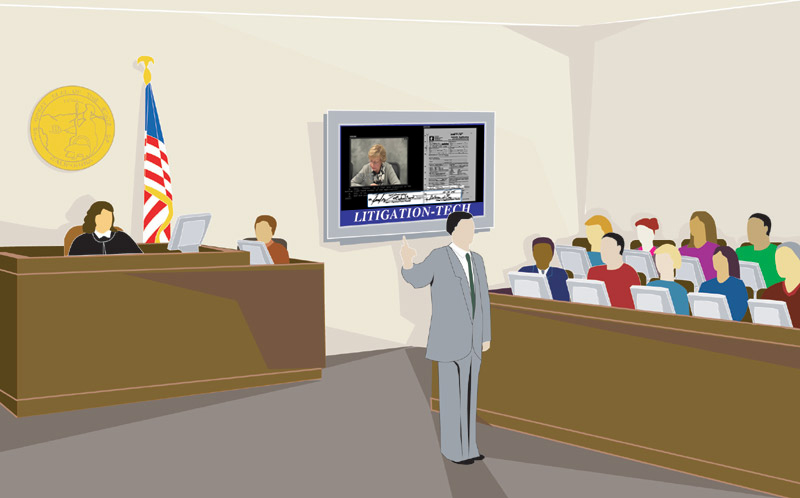Effective trial presentations play a key role in legal proceedings.
Effective trial presentations play a key role in legal proceedings.
Blog Article
Exactly How Trial Presentations Enhance Your Disagreement and Persuade Jurors
Test presentations function as a pivotal mechanism for improving legal disagreements and encouraging jurors. By incorporating visual aids, narrative structures, and emotional engagement, lawyers can develop a compelling instance that reverberates on numerous degrees. The tactical use visuals not just makes clear intricate details yet additionally captures jurors' attention better than words alone. The art of narration plays an equally crucial duty in transforming valid evidence right into an engaging story, shaping jurors' assumptions. Recognizing these aspects can significantly affect test results, increasing the inquiry of just how each part adds to this intricate dynamic.

Importance of Aesthetic Aids
Aesthetic aids play an important duty in improving the performance of test presentations, as they can dramatically boost target market interaction and retention of details. In the context of a trial, where jurors are tasked with handling complex information, aesthetic aids serve to simplify and clarify bottom lines. Graphes, graphs, and photos can share data and ideas that may or else overwhelm or puzzle jurors, enabling for a more simple understanding of the proof provided.
Furthermore, aesthetic aids aid in preserving juror focus throughout the procedures. By breaking the uniformity of spoken statement, these tools can stress crucial debates, making them much more remarkable. Effective aesthetic help can likewise stimulate emotional reactions, which can be crucial in encouraging jurors to line up with the presenter's narrative.

Crafting Engaging Narratives
An engaging story is essential in trial presentations, as it functions as the foundation of reliable persuasion. It permits lawyers to weave with each other truths, proof, and psychological elements into a meaningful tale that resonates with jurors. This narrative framework enables jurors to recognize the intricacies of the instance while directing them with the lawyer's debate.
To craft an engaging narrative, attorneys must concentrate on quality and coherence. This includes developing a clear lead character-- frequently the customer-- and describing their journey through the events concerned. Offering the realities in a sensible sequence enhances understanding and maintains involvement. Furthermore, the usage of vivid descriptions can develop mental photos that aid jurors picture the occasions, making the narrative i thought about this more unforgettable.
Furthermore, incorporating key styles throughout the discussion enhances the core message and help in retention - trial presentations. The narrative ought to not just communicate details however also stimulate a sense of justice, highlighting the risks involved. Eventually, a well-constructed story cultivates a connection between the jurors and the case, placing the lawyer's debate as both reputable and compelling, thus enhancing the probability of a beneficial verdict

Involving the Jury Mentally
Reliable jury interaction pivots on the attorney's ability to attach with jurors on a psychological level. This link can significantly impact jurors' perceptions and their utmost decision-making.
Aesthetic aids, such as photographs or video clips, can better enhance psychological involvement, providing jurors with brilliant depictions of the situation's human components. Crafting a narrative that highlights the battles and triumphs of the people included guarantees that jurors see beyond the legal arguments and identify the human consequences of their decisions.
A lawyer's passionate shipment can reverberate with jurors, strengthening their psychological financial investment in the case. It's essential to balance psychological charms with accurate proof, guaranteeing that jurors really feel urged to act while staying grounded in the reality.
Structuring Your Presentation

The body of the presentation must be practically segmented into bottom lines, each supported by compelling proof. It is advantageous to use storytelling methods to weave realities into a story that jurors can quickly follow. Aesthetic help, home such as look what i found graphes and videos, can boost comprehension and engagement, aiding to highlight crucial pieces of proof.
Real-World Study
Examining real-world case researches provides invaluable insights into the art of trial presentations and persuasion. The defense group effectively employed a technique that combined top-level specialist testimonies with multimedia discussions, which astounded jurors and ultimately influenced their choice.
An additional noteworthy example is the "McDonald's Coffee Situation," where the complainant's lawyers made use of visuals photos of the injuries received by Stella Liebeck. trial presentations. This plain visual evidence played an essential function in conveying the intensity of her burns, resulting in a substantial jury honor. Such instances show that impactful trial presentations typically depend upon the effective integration of visuals and narration to stimulate emotional responses from jurors
Additionally, the "Casey Anthony Trial" highlighted the significance of narrative comprehensibility and credibility. The prosecution's failing to establish an engaging timeline decreased their convincing power, highlighting the need of a well-structured presentation. Assessing these situations reveals that successful trial discussions call for strategic planning, psychological interaction, and the ability to resonate with jurors' worths and ideas.
Final Thought
Trial discussions substantially boost debates and convince jurors via the calculated use of visual aids, compelling narratives, and psychological engagement. A well-structured discussion balances psychological charms with valid evidence, inevitably resonating with jurors' values.
Report this page